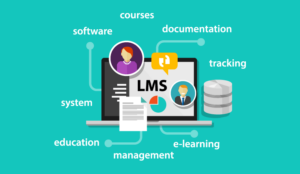Learning management systems (LMS) are a fast-growing trend in business, though the technology isn’t new, having been around for more than 30 years. What is changing is the widespread adoption of e-Learning platforms in individual businesses.
Currently, the industry is estimated to have a value exceeding $15.7 billion, with more than half of systems deployed being hosted in the cloud. The remaining 45% of LMS are hosted on-site.
But the critical questions are:
- What is the value of an LMS to business?
- Does it improve productivity and retention?
- Does it make a real impact on the business’s bottom line?
Let’s consider some of the business benefits:
Low Cost
Compared to ongoing classroom-type training, an LMS is relatively low cost both to implement and to maintain. When hosted in the cloud, there’s an affordable initial set-up cost.
On the other end of the scale, hosted on site, there’s a benefit to lower long-term costs. On average, LMS implementation can reduce training costs by 26%.
Quick to Implement
Most LMS can be implemented in 6 months or less, which means that employee training can be rolled out relatively quickly.
On the rare occasion when a system is particularly complex, it could take up to 2 years to get up and running. But even then, test versions may be available sooner.
Easy to Integrate Mobile Apps and Gamification
Because an LMS operates on a digital platform, it’s relatively easy to include gamification and integrate the learning modules into mobile apps to make it more accessible to employees and more enjoyable too.
Improves Employee Engagement
When learning is made fun, easy and accessible, employees are more likely to participate. Gamification is a particularly effective learning tool, as it creates an environment of friendly competition within the organisation.
Employees are encouraged to complete modules and can see how they are doing compared to colleagues. They can create leaderboards and encourage participation and performance with their peers.
Aids Learning Retention
Perhaps one of the strongest benefits is that an LMS can be set up to reinforce learning on a regular basis by running quick knowledge tests with employees. This can be done via email, mobile apps or even a gamification platform.
Studies show that continued bite-size learning improves retention significantly, as well as performance.
Easy to Maintain and Manage
Once a system is up and running, it requires relatively little maintenance and when required it can be done easily. Most systems are set to run automatically, interacting with employees and rolling out learning modules and testing at the employees’ pace. This means that little management is required, which frees up L&D managers to focus on other tasks such as creating the learning content and testing questions.
Easy to Change and Update
If new modules need to be added, this can be done with relative ease, as the format and structure remains the same, with only the content changing. This makes the task much easier for L&D managers, who then have a framework within which to design learning materials.
Management Reporting
With online learning, managers can easily pull reports showing which employees have completed what modules, and what results they achieved in testing. This not only reflects individual performance, it also shows the level of engagement and proficiency.
In addition, it can quickly identify knowledge gaps and training needs and modules can then be adapted to address these.
Easy to Scale
Whether an LMS is rolled out in a single office with ten employees or a global multinational, the basic framework and principles of the system remain the same.
The benefit to a business is that as it grows and increases its workforce, the system can easily be scaled to accommodate more users.
Multiple Locations
Because most LMS are hosted online, (either in the cloud or on a company’s private server) they can be accessed from anywhere, as long as there’s a secure internet connection. This means that if an organisation has multiple offices or people working off-site, they can still participate in online learning, as the system allows for the flexibility of homeworking.
Increases Productivity
Studies show that LMS implementation can improve productivity by as much as 53%. This is significant as it makes an organisation that much more efficient.
Decrease Staff Attrition Rates
Because an LMS encourages employee engagement, organisations that use them find they have lower staff turnover. An average 16% reduction in attrition can make a significant impact on the business bottom line.
Increase Revenues
Despite all the cost savings and other benefits, what the board really wants to know is if an LMS can boost revenues? The answer is yes!
With improved knowledge retention and productivity, revenues increase on average by 40%, assuring a positive ROI.
Author: Robyn Coppell
Published On: 22nd Jan 2018 - Last modified: 4th May 2018
Read more about - Guest Blogs, Ember



































